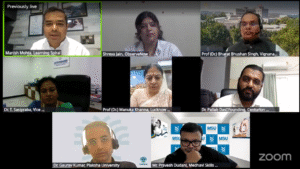Elevating BFSI Compliance: The Strategic Impact of Regtech on Regulatory Adherence and Risk Management

Compliances are the highest priority for the Banking, Financial Sector, and Insurance (BFSI) companies in India. The regulatory authorities of the BFSI are strengthened to maintain the stability, security, and process of the BFSI’s for continued improvement. The compliances of BFSI’s start with licensing, and further it extended to a huge number of activities like reporting, publishing, notifying, displaying, maintaining, and so on. Maintaining and monitoring the compliances with the help of software is necessary for every company to avoid the non-compliance, reduce the human effort, know the latest changes, escape from penal consequences, maintain the dignity in the industry, and value the company in public eyes.
The BFSI industry plays an important role in India for the growth of the country and to improve the lifestyle of the citizens of India. India being the second-largest country in the world on population, it’s necessary for the Indian government to make the powerful regulatory authorities monitor the BFSI’s very closely. The regulatory authorities monitoring mechanism is used by the BFSIs for the purpose of compliance monitoring and compliance reporting. The Reserve Bank of India (RBI) found there are errors in the compliance submissions, which are human-made reports. There is a lack of use of software-generated compliance reports, or the reports generated with the help of a tool. RBI identified some of the BFSI’s don’t have any software or automated regulatory technology for the compliance monitoring.
The Reserve Bank of India (RBI) recommends banks adopt software-based compliance solutions and monitoring mechanisms by June 2024. The recommendation of the RBI is an alarming signal to the BFSI’s to think about Regulatory Technology (Regtech) support in implementing a software-based compliance monitoring system. The RBI recommends the software to reduce the human effort and to automate compliance monitoring with the help of the software, and it helps the human errors in compliance monitoring.
The Digital Personal Data Protection Act (DPDP Act) is published by the Indian government for the protection of personal data like KYC, Aadhar, and other confidential information. The DPDP Act mandates the protection of every individual person by the BFSI’s, and in case of breach of the data protection, it will lead to a high level of penalisation for the BFSI’s. The BFSI’s necessary to comply with the conditions of the DPDP Act to stay in compliance. The DPDP Act recommends compliance monitoring and tracking the requirements under the Act.
In India, very few Regtech companies are aware of the complete regulatory requirements for BFSI’s. The investments of Regtech companies are made for the purpose of customising the software and updating the software as per the requirements of the BFSI’s. The regulatory changes necessary to modify the applicability and dashboard by the Regtech companies consume cost and time. Reputed Regtech companies hold a separate team of expertise to manage the latest changes notified by the regulatory authorities to incorporate the same in the software and update the dashboard of the software to reduce the risk of non-compliance.
The Regtech software and GRC tool providers support the BFSI companies to monitor the compliance status with the risk level against each non-compliance identified. Simplifying the dashboard and making it easy to understand in simple lines are the success of the tool. Regtech software/GGRC tool provides at most comfort to the BFSI companies to know the applicable compliances, risk in case of non-compliance, person responsible, monitoring authority, and even score against each compliance across the nation covering all the locations.
Maximum BFSI’s holds a tie-up with Regtech companies for GRC Tool for the purpose of a tech-driven monitoring system of compliances, but the implementation of the same will have challenges. The RBI guidelines for streamlining the internal compliance monitoring system and leveraging the use of technology will have a significant impact on Regtech companies to think of continued improvement. The BRI guideline clarified a comprehensive review of the existing compliance tracking and monitoring process and instituted necessary changes to the existing system or implemented a new system by June 2024. This makes RBI believe in the technology-based solution for the purpose of monitoring the compliances.
The GRC tool or software-based monitoring will have much impact on the reduced human errors and change in compliances. Monitoring the change in compliances will be a big task for the BFSI companies; making the necessary changes in the compliance monitoring checklist also creates impact. The cost of compliance becomes most important to the BFSI companies; the Regtech solutions are the easy way to adherence with applicable compliances and reduce the human cost for the purpose of monitoring.
The Regtech solutions on the compliances are wide in nature; it starts with mapping the compliances, updating the changes, capturing the data, amending the regulatory requirements, displaying the status of compliance, highlighting the risk, suggesting the mitigation of non-compliances, reporting generations, and more. The Regtech solutions help the BFSI companies to review the status and share the required reports with the regulatory authorities.
Banking, Financial Sector, and Insurance companies are necessary to hold an Regtech software/GGRC tool for the purposes of compliance and monitoring. The help of the software/GGRC tool will reduce the errors in any form of reports generated out of the same. The latest changes adopted by the RBI and the legislation related to data protection personal data (DPDP Act) have a huge risk in terms of any non-compliances or any miss in the applicable compliances. To avoid the penal consequences, every BFSI must be aware of the status of compliances across all the operating locations. The Regtech software/GGRC tool helps the BFSI’s to identify the non-compliance and risk management against the same. The latest dashboards help the responsibility mapping, monitoring, customising, and so on to help the banking, financial sector, and insurance to focus on business, not on regulatory compliances.
Author: Munab Ali Beik, Head Compliance Advisory Practices, Core Integra.
Disclaimer: The views expressed in this article are solely those of the author and do not necessarily reflect the opinions or policies of ObserveNow Media. The author is solely responsible for ensuring the accuracy, completeness, and validity of the information presented, encouraging readers to independently verify and seek professional advice if needed.
















